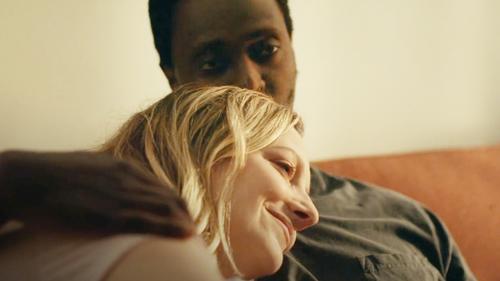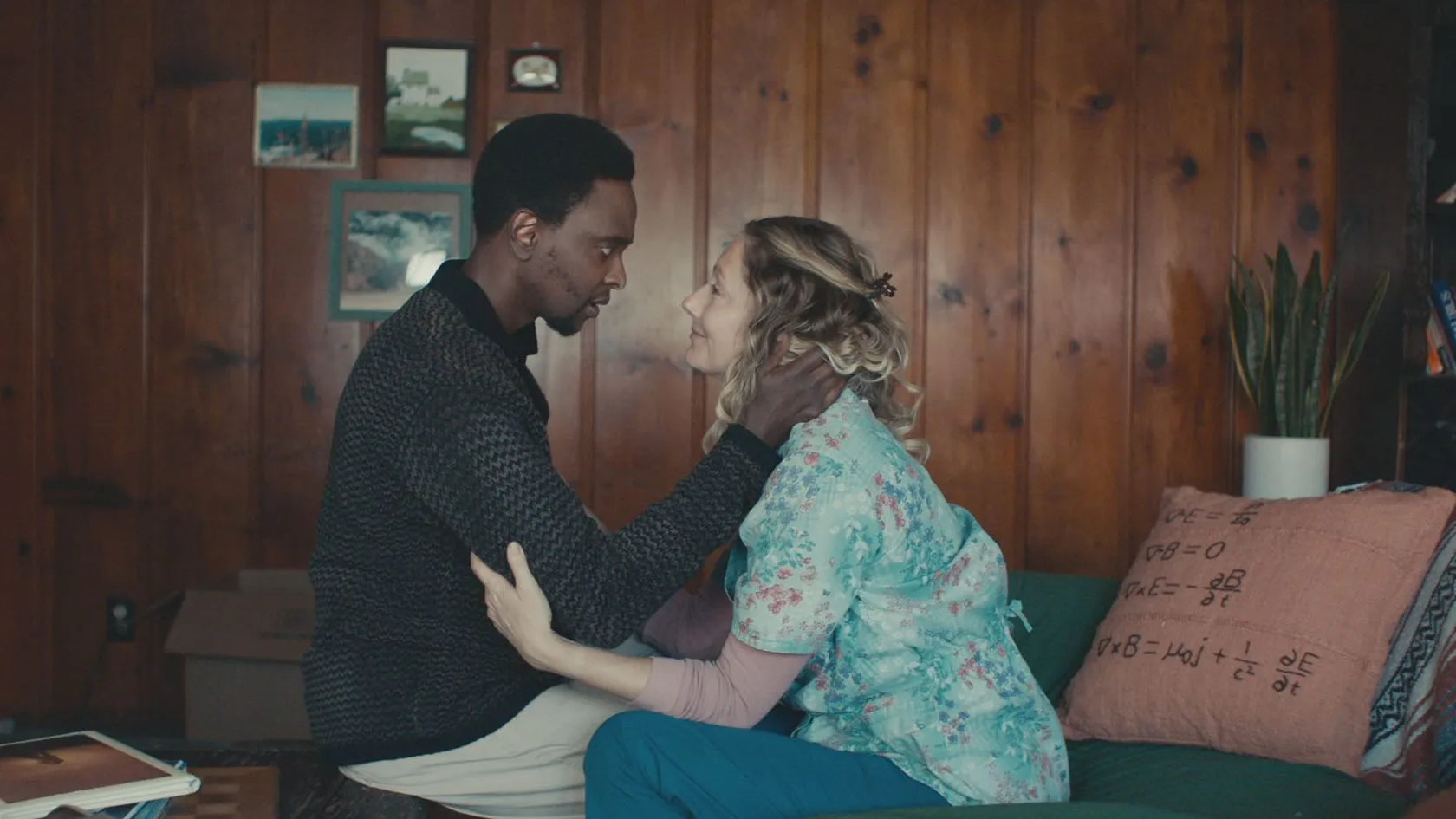Aporia Movie Recommendation and Detailed Ending Explanation. Listen carefully to this next statement, because I’ve never made it before, and I’m doubtful I’ll ever say it again. If you are looking for hardcore mindjob indie movie that will make you think about the deeper meaning of life while giving you a run for your mental money? Aporia is that movie. No. Calm down… it’s no Primer. But I would argue that Primer isn’t the movie that you think it is anyway… it’s a story about relationships, and the experiences and mental shifts that will stretch the bonds of friendship. Similar thing happens here with Aporia – that also happens to be a time-based-mindjob.
Let’s get to it. But know – if you read this before watching the movie – you will have ruined the single best non-Primer experiences since Primer. As I’ve already said.
Walkthrough of the Movie Aporia
The movie opens with Sophie (played by Judy Greer), grieving eight months after a drunk driver killed her husband, Mal (Edi Gathegi). Her life is a wreck. Her daughter disdains her. And she is drowning. Enter Mal’s best friend, Jabir (Payman Maadi) who has been working on a thing. It was supposed to be a time machine… but it didn’t work. Still, he’s managed to create a time sniper rifle – which could almost be as good a time machine, sort of. If you are paying attention – you’ll know where this is going. Maybe Jabir and Sophie will team up to murder Mal’s murderer? Maybe? Because you are clever like that. Wait… how would that work? Let’s pause for a quick second.

How Does Aporia’s Time Component Work?
The time bullet changes the timelines. Time continuum’s. We are dealing with lines of falling dominoes:
Timeline 1:
1. Mal is alive
2. Mal is hit by a drunk driver
3. Sophie and her daughter’s lives are ruined
Timeline 2:
1. Mal is alive
2. Darby, the would-be drunk drive is killed by a time bullet
3. Happily, Mal isn’t killed
4. He goes on living with Sophie and their daughter
So, you have one timeline going that way —–> and you have another timeline going this way <—— – Right? N’er the twain shall meet. But that’s not how the time sniper bullet works here. Instead, we are introduced a third, new timeline, and this is from Sophie’s perspective:
Timeline 3:
1. Mal is alive
2. Mal is hit by a drunk driver – dies
3. Sophie and her daughter’s lives are ruined
4. Sophie and Jabir murder Darby keeping #2 & #3 from happening
5. Mal walks around the corner, having experienced Timeline #2
6. Their family blissfully goes on.
Got it? It’s an important component to understand. Great, then let’s continue.
Continuing the Downward Spiral
Once everything is back to where Sophie was desperate to be, Sophie’s conscience won’t leave well enough alone. She begins to investigate the various ripples that impacted the people close to Darby. Specifically Darby’s widow and daughter. Feeling guilty, she befriends them and begins to help them.
Enter new villain. A psychopath, a mass murderer, a rapist… what are you supposed to do with power like this? Who deserves to live? Who deserves to die? The machine can only go a few years backwards, so we can’t stop World War II. But it would make sense to begin knocking off serial killers, mass shooters, etc. Right? Why wouldn’t you? You know for a fact that they will kill, because they did. Past tense. So, why not murder the murderer and release the victims forward through time to continue living their lives?
I’ll tell you why not. Time Ripples – that’s why. Every time that a change in the past occurs, regardless of how good, or bad, it causes changes in the current timeline.
Regardless, where the intrigue lies is when Sophie realizes that Darby never became a raging alcoholic in her newly modified timeline. And as a result of his murder, his wife needs to sell her amazing bakery. And debt from medical bills because her daughter is not well at all. And when the trio continue to randomly roll the Quantum Dice and they come up snake eyes – now what are they going to do? What snake eyes, Taylor? You know, the cosmic ones… the ones where their daughter flips into a boy. Wait, WHAT? Well, anything can happen when you are messing with time that far back. So, how do they fix it? Roll the dice again, of course. But this time? This time, it’ll not be Sophie pulling the trigger. See?
The Problem with Aporia
The sprawling cancer that is eating Sophie, this time dysphoric disorder, is also the thing that unmoors the viewing audience to these characters. When the changes become drastic enough to flip characters into and out of existence again, and change them completely, it becomes difficult to care about them. And yet, it’s central to the theme and plot of the movie. (A movie that pulls these subtle changes off perfectly? Coherence. An absolute master class in doing exactly this, but perfectly.)
Ending of Aporia Explained
The Greek word Aporia (ᾰ̓πορῐ́ᾱ) – is a word that sort of connotes philosophical puzzlement. You know, like a conundrum. Aporia has a moral backbone that is worth paying attention to. Think about it… what would you do if you were handed a tool like this, with immortal powers like this? What would you do if put in this position? No, I mean – think about your life! It’d be tricky. Save the world? Save yourself? Kill that office competitor? Stop that local bank robbery? Go after Hannibal Lecter? It’s a really clever question, and speaks to a deeper/darker issue in our own soul. Why would we change our lives? Why can’t we accept the hand that we are dealt day after day? What is it that we are actively doing to try and control about our lives? What does that mean about us? Not life. Not the cosmic dice. But about us.
The ending of Aporia is 100% deliberately ambiguous. It has intentionally left itself open to viewer interpretation. But even so, we watched as these individuals attempted to better the world for a few people – only to realize that that the house of cards has come crashing down as a result. As the film careens to the end, we watch as the ramifications of time manipulations get wider/broader, and more impactful. And in turn, we see that Sophie begins to realize the carnage she has created as a result of her initial – completely understandable – selfishness. The details that are left unresolved serve to show the thoughtfulness necessary to even consider something like this. That all life, all actions, are intricately interconnected. You don’t exist without me, I don’t exist without you. My flawed choices are never chosen in a vacuum. And It’s stupid to think that we can just pluck, or tweezer out, just one single stitch without the entire garment falling apart.
My Own Thoughts on Aporia
Which is why I think that Aporia is the best sci-fi mindjob since Primer. But that sentence can only make sense if you really grasp what Primer did so well. It wasn’t a technology/time travel movie. Shane Carruth asked a simple question with his groundbreaking movie, and that is, what power in the universe could strain, or break, the strongest of friendships? And what would that look like when it snaps? Yes, I’ve studied the loops, and the curves and timelines of Primer. I get how the timeline works. But all of that doesn’t matter a lick. It’s actually a story about two friends, and what broke them both. (Can someone get a note to Mr. Carruth and let him know I’d hand him the keys to my car if he’d agree to an interview? Thanks for that.)
Similarly… while not the same mental caliber as Primer, and while definitely in a different stratosphere as Primer… Aporia definitely asks very similar questions. The movie Aporia definitely makes us consider what we would do in similar situations, and if we would gamble with all the same cosmic chaos on the line. Which, when we come right down to it, is what really makes a movie great. Was it perfect? NOPE. Was the acting anything to write home about? Absolutely not. But it was poignant, and on target, even though the idea and the story had intrinsic flaws that would be difficult to overcome with even the greatest of screenplay writers. (Even better than Coherence, Time Lapse is the movie that crushes this sort of chaos even better. If you don’t know it, man, that screenplay is the tightest bit of perfection ever written.)
Edited by: CY



